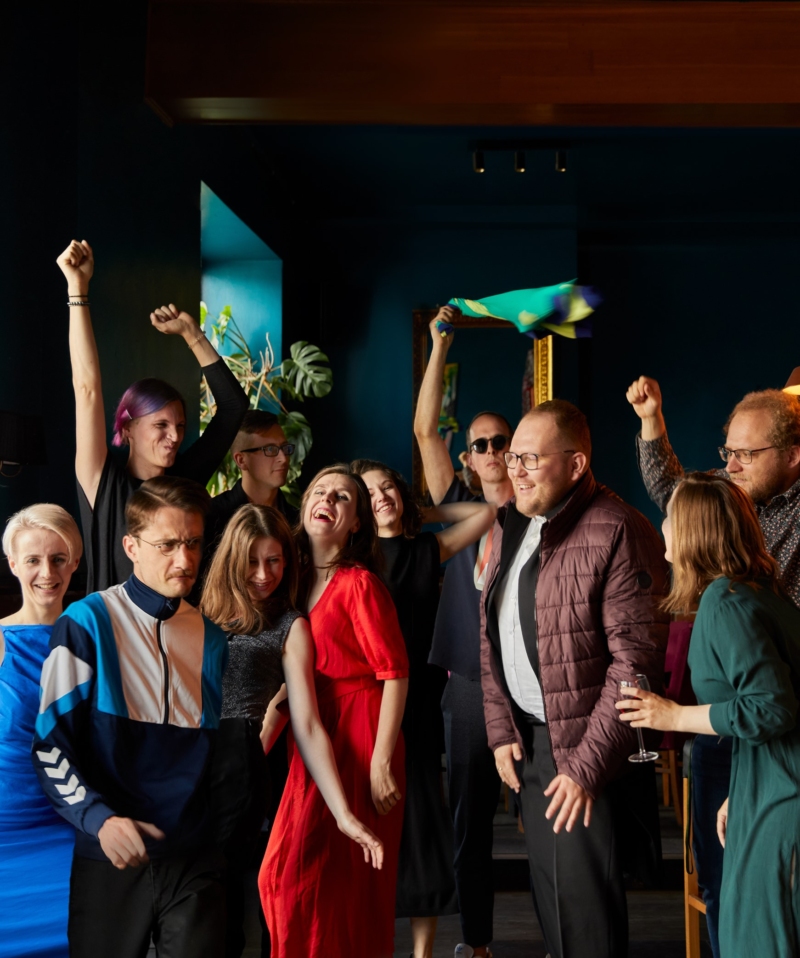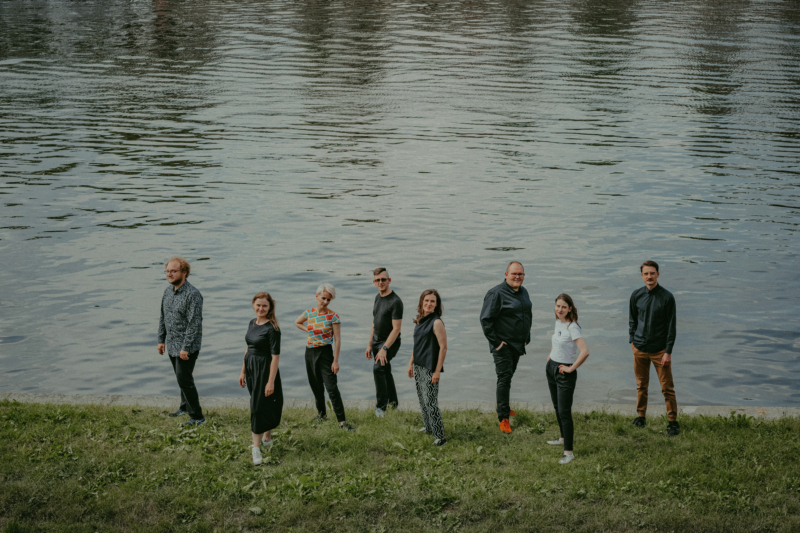READER: MUSIC COOPERATIVE
12.08.2023

Artur Zagajewski: […]! (2023) – 10′
World Premiere / Commission of the Darmstadt Summer Course and Spółdzielnia Muzyczna
Nina Fukuoka: Polka is a Czech dance (2023) – 14′
World Premiere / Commission of the Darmstadt Summer Course and Spółdzielnia Muzyczna
Monika Szpyrka: Wallflower (2023) – 10′
World Premiere / Composed within the framework of “The Creative Scholarship of the City of Krakow”
Rafał Ryterski: Birdsongs (2023) – 30′
World Premiere
The piece by Rafał Ryterski makes use of strobe lights.
With the friendly support of the Ernst von Siemens Music Foundation and The Foundation for Polish-German Cooperation

Spółdzielnia Muzyczna Contemporary Ensemble:
Małgorzata Mikulska (Flutes)
Tomasz Sowa (Clarinets)
Krzysztof Guńka (Saxophones)
Paulina Woś (Violin, Viola)
Barbara Mglej (Violin, Viola)
Jakub Gucik (Violoncello)
Aleksandra Płaczek (Piano, Keyboards)
Aleksander Wnuk (Percussion)
AMBIENT MUSIC
The concept of music designed specifically as a background feature in the environment was pioneered by Muzak Inc. in the 1950s, and has since come to be known generically by the term “Muzak”. The connotations that this term carries are those particularly associated with the kind of material that Muzak Inc. produces – familiar tunes arranged and orchestrated in a lightweight and derivative manner. Understandably, this has led most discerning listeners (and most composers) to dismiss entirely the concept of environmental music as an idea worthy of attention.
Over the past three years, I have become interested in the use of music as ambience, and have come to believe that it is possible to produce material that can be used thus without being in any way compromised. To create a distinction between my own experiments in this area and the products of the various purveyors of canned music, I have begun using the term Ambient Music.
An ambience is defined as an atmosphere, or a surround- ing influence: a tint. My intention is to produce original pieces ostensibly (but not exclusively) for particular times and situations with a view to building up a small but versatile catalogue of environmental music suited to a wide variety of moods and atmospheres.
Whereas the extant canned music companies proceed from the basis of regularizing environments by blanketing their acoustic and atmospheric idiosyncracies, Ambient Music is in- tended to enhance these. Whereas conventional background music is produced by stripping away all sense of doubt and uncertainty (and thus all genuine interest) from the music, Ambi- ent Music retains these qualities. And whereas their intention is to ‘brighten’ the environment by adding stimulus to it (thus supposedly al- leviating the tedium of routine tasks and levelling out the natural ups and downs of the body rhythms), Ambient Music is intended to induce calm and a space to think.
Ambient Music must be able to accomodate many levels of listening attention without enforcing one in particular; it must be as ignorable as it is interesting.
Brian Eno (1978)
Monika Szpyrka: Wallflower
for ensemble and electronics
According to definitions a wallflower is a pleasant smelling garden plant that grow in groups, but also a shy person, especially a girl or woman, who is frightened to involve herself in social activities and does not attract much interest or attention.
The piece was written for Spółdzielnia Muzyczna Contemporary Ensemble.
The piece was composed within the framework of The Creative Scholarship of the City of Krakow.
Nina Fukuoka: Polka is a Czech dance
In my world, existing structures enable and facilitate specific patterns and processes over others. Those result in actions that are meant to be constantly assessed and evaluated by other people and technology.
As I navigate my way through this sinister age of surveillance, accompanied by irony and misunderstanding on the side, I cannot help but wonder about alternative worlds: Are AIs in other dimensions working minimum wage jobs and humans being the ones tasked with making art and poetry? Are they less lonely?
“It seemed to K. as if all contact with him had been cut, and he was more of a free agent than ever. He could wait here, in a place usually forbidden to him, as long as he liked, and he also felt as if he had won that freedom with more effort than most people could manage to make, and no one could touch him or drive him away, why, they hardly had a right even to address him. But at the same time—and this feeling was at least as strong—he felt as if there were nothing more meaningless and more desperate than this freedom, this waiting, this invulnerability.”
― Franz Kafka, The Castle
Rafał Ryterski: Birdsongs
Birdsongs – imaginary documentary movie about migration of birds, with live music performed by Spółdzielnia Muzyczna
Sway, go on, move. That’s the only way to get away from him. He who rules the world has no power over movement and knows that our body in motion is holy, and only then can you escape him, once you’ve taken off. He reigns over all that is still and frozen, everything that’s passive and inert.
So go, sway, walk, run, take flight, because the second you forget and stand still his massive hands will seize you and turn you into just a puppet, you’ll be enveloped in his breath, stinking of smoke and fumes and the big rubbish dumps outside town. […] Flee, get out of your homes, go, run away, for only thus will you avoid the traps of the Antichrist. Any open battle with him will be lost outright. Leave whatever you possess, give up your land and get on the road. […] Get out of here, go far away, beyond the reach of his breath, beyond his cables and wires and antennas and waves, resist the measurements of his sensitive instruments. […] Move. Get going. Blessed is he who leaves.
Excerpt from the book Flights by Tokarczuk Olga
Interview with Spółdzielnia Muzyczna
Gerardo Scheige: How would you describe the work within the ensemble in general, and regarding contemporary music in particular?
Małgorzata Mikulska (Flute): Currently, Spółdzielnia Muzyczna consists of eight members. The work is divided into two sections, an organizational and an artistic section. Like any ensemble we have a management team, which is made up by musicians. Jakub Gucik is our chairman, who is going to explain his role and his duties, I guess. Our second chairman is Tomasz Sowa, who is responsible to keep our budget in a good shape. Additionally, Emilia is taking care of the contact with composers, festivals and the applications for financial support. She is a huge help during the dress rehearsals and the concerts as well. Paulina Woś, our violin player, is responsible for the schedules. She is the perfect person for it, being capable to get the best out of our availabilities. Finally, there is our percussionist Aleksander Wnuk, who has recently taken care of all the weird, collected sound objects that come to use. At this point, organization meets musical practice. Within our work we try to find a democratic way for a common artistic vision including a variety of ideas and results.
Jakub Gucik (Cello): I can agree with everything. When the organizational stuff is done, we are musicians that like playing together, developing ideas together. Of course, sometimes it‘s hard to find common ideas and common solutions, but in the end, we always pull ourselves together again. And that’s our way of thinking about and working within the ensemble.
GS: A question on this: the way of working reflects the name of the ensemble, which means cooperative in English. So, when Spółdzielnia started in 2014, the basic idea was to choose a name that would describe the way of working?
MM: Exactly. What I can add is that the name establishes a relationship with our generation. The term was quite popular in our youth being kids and students, when ‘spółdzielnia’ was linked to a housing cooperative. The name of our ensemble refers to that time, including democratic thoughts. A lot of people used to say that Spółdzielnia doesn‘t have a strong identity, because we are doing a lot of different things. But everything we are doing is interesting for us, and we feel like we are developing our skills, our playing and the spirit of the ensemble. I think, that’s what we both have in common.
GS: How and where did you all meet?
MM: We are from Cracow. I mean, we studied together, most of us. Some of us knew each other from school, like Jakub and Barbara Mglej, our violin player.
JG: Yeah, we have known each other for twenty years now, since elementary school.
GS: What about your Darmstadt Summer Course program? Do you want to tell us a bit about it?
JG: Sure. We are playing two concerts, and are preparing an additionally one for the Open Space program. In the first concert on 7 August, we will play a long piece: For George Lewis by Tyshawn Sorey. For us, it‘s going to be very interesting, because we will expand our ensemble a lot. For the piece, there will be sixteen performers in total, including additional instruments, e.g. French horn and trombone. For me personally, it’s a special situation, because I knew George Lewis as a trombone player before I started to play composed contemporary music. I knew that he played a lot of free jazz, really crazy things. And then I realized that he was a classically educated composer and teacher. One of his students was Tyshawn Sorey. So, it‘s very moving for me that we will be playing Sorey’s piece, which is a tribute to George Lewis. The second concert on 12 August is made up of four premieres by Polish contemporary composers, four different personalities. Artur Zagajewski’s work will be some kind of punk inspiration of Polish grunge music. Rafał Ryterski is a composer and a DJ; he does a lot of long pieces linked to dance and (popular) electronic music, some kind of techno. He is writing a piece about the meaning of poetry of the birds, something really metaphoric and esoteric. What else? Yeah, Nina Fukuoka, a very interesting composer living in New York. It will be a multimedia piece, dealing with the changes in Polish society during the last 30 years, among other things. Finally, we will play a composition by our friend Monika Szpyrka, who lives in Cracow as well. Her music moves us very much and speaks directly to our feelings.
Excerpts from a talk between Spółdzielnia Muzyczna, Mivos Quartet and Gerardo Scheige.
